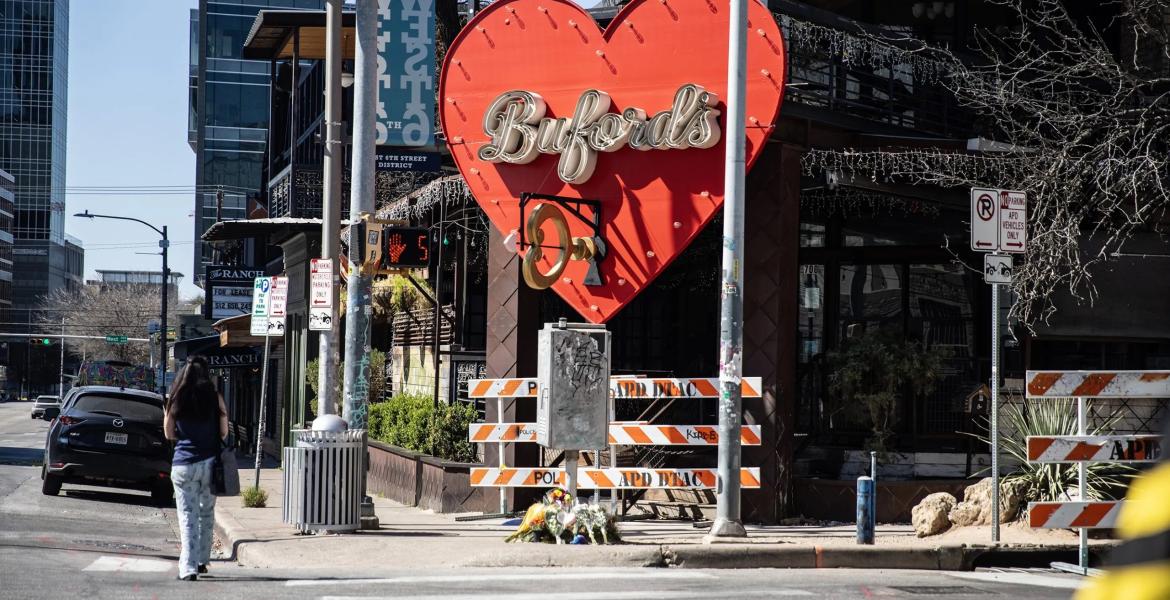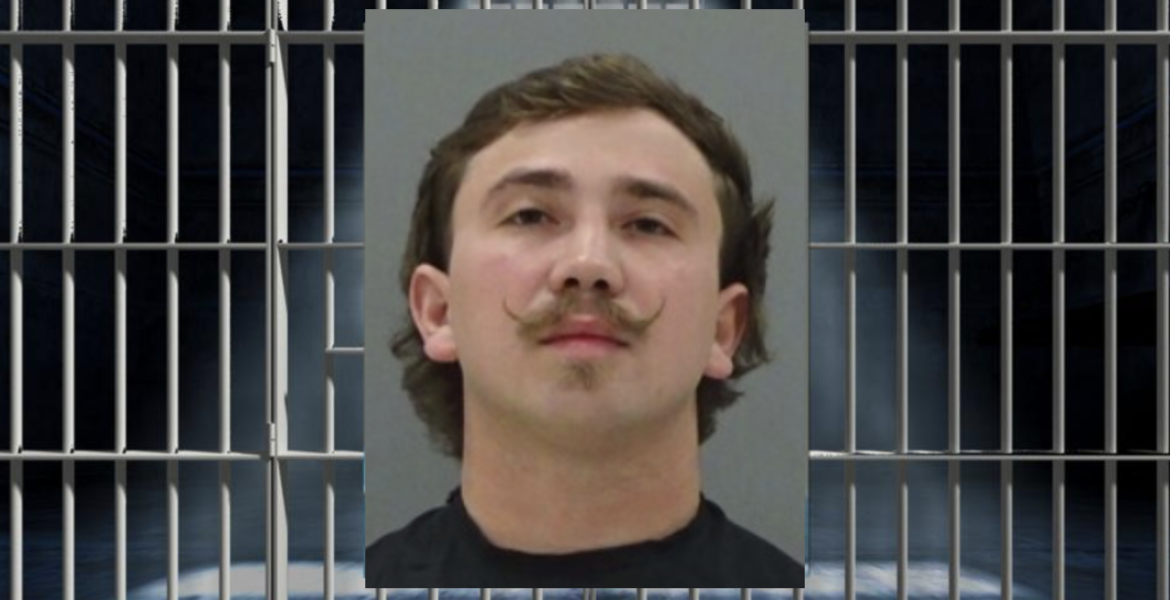Charles Flores was roughly 8 years old when a man wearing a gun and a badge walked into the salon where his mother cut hair, a deputy investigator with the Tom Green County Sheriff’s Office.
The detective, Ron Sanders, was there to visit his mother’s boss, who routinely cut his hair at the small shop in Grape Creek.
“I would see him in uniform, and I would see him wearing a Mickey Mouse tie and a gun and a badge, then a Donald Duck tie, and I’m like, ‘this guy is a cop. Why is he wearing that?’” Flores recalled. “But he did child crimes. And I thought, ‘man, you get to be this great hope for people, for children,’ and that’s really what started me on it.”
Seventeen years later, the little boy looking at the Mickey Mouse tie had grown and put on his own uniform, dedicated to a life in law enforcement that began at high school graduation and has only proliferated since.
Charles “Blue” Flores graduated from Water Valley High School in May 2008 and turned 18 the following month, immediately starting as a correctional officer at the Tom Green County Jail three weeks after his birthday.
“Unfortunately, in Texas, you can’t be a peace officer until you’re 21,” Flores explained. “So I just said, ‘you know what? I might as well get my start in law enforcement here,’ and that’s where I started, at the jail. That alone is what helped me be the officer that I am today.”
Going from the small country community of Water Valley to the thick, gray walls of the county correctional facility was an adjustment, Flores said, noting that his world now centered on caring solely for inmates and securing their safety.
“I worked the 4-midnight shift there and I went to ASU during the day, so I started my morning at 6 a.m., got up, went to school almost all day, worked 4-midnight at the jail, and drove back home,” he said. “I did that till I graduated college in 2012.”
During his time behind bars, Flores was promoted to supervisor of the midnight-7 a.m. shift, which kept him awake all night before going to class the following mornings to work toward his degree.
“Ramen noodles, Twinkies and energy drinks were my diet,” he laughed.
After he graduated college, Flores remained on the late night shift and put himself through peace officer classes at the Concho Valley Council of Governments, which held classes three evenings a week and every other Saturday for nine months. He said he contemplated applying to the San Angelo Police Department at that point, which would have given him a conditional job offer and paid him as a recruit during his time at the academy, but there was still much to be learned working inside the jail, Flores said, so he stayed on to gain experience.
“While I was at the jail, I was a gang officer,” he explained. “I was part of our response team there. I did a lot for the jail, and I didn’t really want to leave. The sheriff said that he would carry my commission if I went to the academy, so I said, ‘sure, why not.’ I had planned on staying there for a while, but the police department was just too good to turn down, so I eventually came over here.”
As a gang officer, Flores was in charge of identifying gang members, documenting their affiliations, and providing that information to law enforcement. There is a high concentration of gang activity going on behind those walls, he said, and the gang officer plays a vital role in ensuring that all information on members and their activities is documented.
The experience and expertise gained as a correctional officer has landed Flores in the courtroom on various occasions, where he was called in to testify as a gang expert. The young officer is also a certified instructor for the Texas Coalition on Law Enforcement, and has developed his own curriculum on gang identification and a medical state known as “excited delirium”.
“It’s this crazy behavior that people see, and the end result is him dying in police custody,” Flores said, pulling up a “Cops” video on his phone in which a man, who appears to be mad on drugs, begins rambling about things that don’t make sense with his eyes dazed, eventually becoming combative with police and then suddenly stopping, dead. “All over the nation, officers were experiencing this kind of stuff, and they just assumed, ‘oh, well he’s just high on something.’ Which he may be, but people are dying in police custody and going to autopsy and they’ve got no narcotics in their system.”
Excited delirium is not very common, Flores said, but more and more cases are cropping up, and without proper and quick diagnosis, people could die. Currently, there are only seven people certified to teach courses on excited delirium in the state, and one of those is Charles “Blue” Flores.
Locally, Flores said he’s seen one case that he believes could have been excited delirium, and thankfully, that individual did not die. The incident occurred during his time at the jail, when a male inmate became combative and took on some five guards.
“There’s instances during my time at the jail where we’ve fought someone, and we usually won because we have to,” Flores said. “That night I thought we were going to lose. There were five of us restraining him, and he does this alligator roll and [comes off] the wall, and is ready again.”
Eventually, the man was restrained and taken to the hospital, but when Flores began hearing about excited delirium he took note of San Angelo’s drug and mental health community and decided to bring that type of training here. Now he teaches classes for law enforcement officers and others who need it.
“I feel like patrolling—putting my badge and gun on, patrolling and going home—isn’t really me,” he said. “I feel like there’s more to law enforcement…law enforcement’s so multi-faceted, I wanted to experience and achieve whatever I could. And if I can pass it on knowledge-wise, it would be great.”
Flores holds a degree in sociology with a concentration in criminology and deviance, and during college he focused on case studies of child molestation, serial murder and rape, taking note of the actions and behaviors of inmates on the night shift at the jail. Those experiences have driven a desire to continually learn and expand upon his knowledge and understanding of people and why they make the decisions they do.
“I made a commitment to myself as a kid because my dad struggled with addiction issues, and I wanted to be a better father and a better person than he was,” Flores said. “I just wanted to be more. I didn’t want to settle for the bare minimum in life. I wanted to just achieve, achieve, achieve, and that’s what we do. My family is what keeps me motivated. I’m six classes away from getting my graduate degree in applied criminology, but they keep me going. My family—without them, I’d be really boring. I really think so.”
This month, Flores celebrates two years with the San Angelo Police Department. He has also been selected as the Officer of the Month by the SAPD command staff, who cited his leadership, potential and teamwork capacities as reasons for the selection.
At the department’s annual awards banquet in May, Flores was named the SAPD Rookie of the Year for 2014. In 2013, the young officer was recognized along with Jeff Fisher and Travis McGee with life saving awards, after the three cops kicked down doors and helped evacuate citizens from a burning apartment building. That incident remains the most impactful of his career thus far, Flores said, but he hopes to have many more as he lives out his career at the SAPD.
“I want to stay with SAPD as long as I can,” he said. “San Angelo is my hometown. I don’t feel the need to leave without making it better. One of the things I learned at the jail from Captain Todd Allen was ‘legacy leadership’. That if you do something for someone or a department, and you’ve improved it, then you’ve done your job. And that’s my goal.”
Subscribe to the LIVE! Daily
Required






Post a comment to this article here: